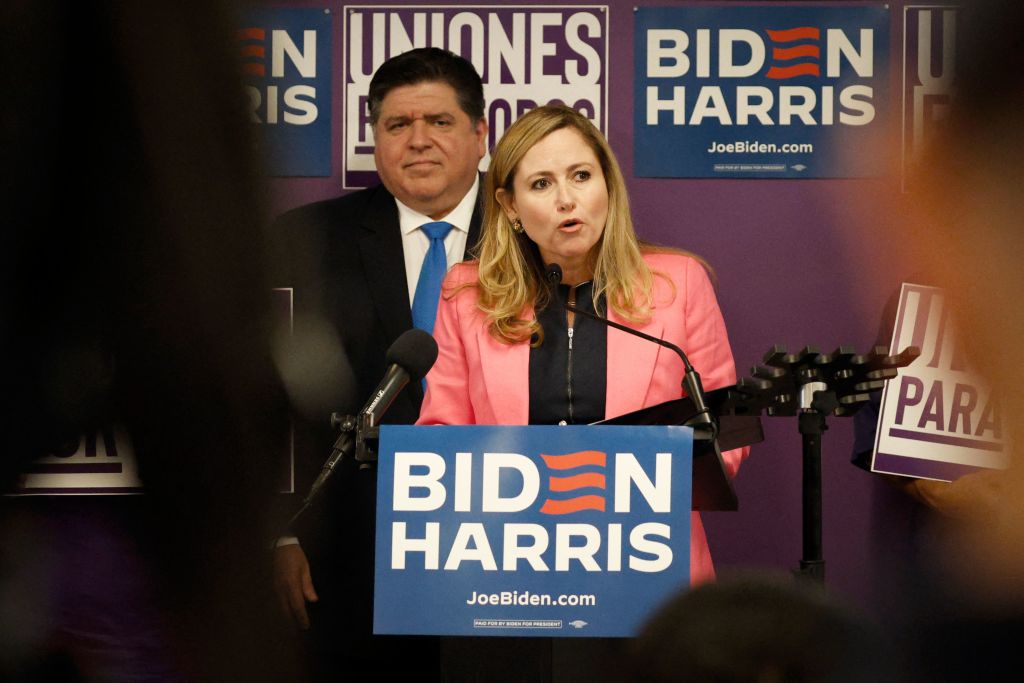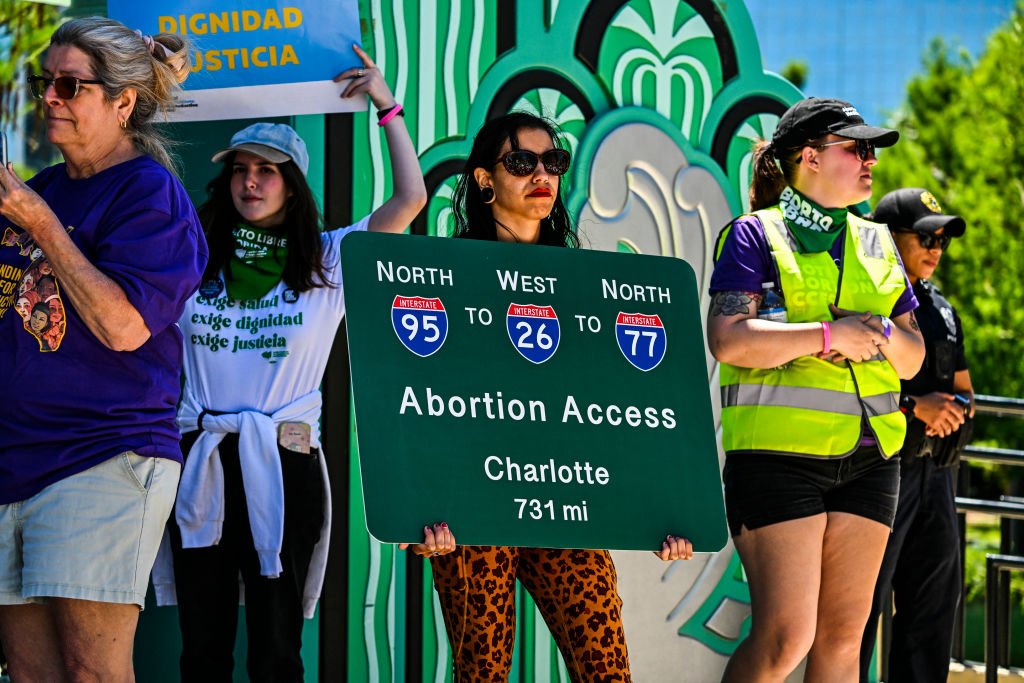
On a recent Sunday, a couple hundred politically engaged Floridians are sipping sparkling water and nibbling on Biscoff-crusted cheesecake bites at a posh golf club located along the state’s southeast coast. Not Mar-a-Lago. This event is 27 miles away, at the similarly lavish Boca Grove Golf and Tennis Club ($200,000 initiation fee, $45,000 annual dues).
At this point, Hurricane Milton has not formed. Hurricane Helene is still four days from making landfall, and Florida Democratic chair Nikki Fried and Democratic Senate nominee Debbie Mucarsel-Powell are making the case to the Brooks Brothers–loving crowd that more auspicious winds—political ones—are sweeping the state.
Fried invites the large room of club members and guests to envision their living rooms as election results start to trickle in on November 5: “We’re all watching MSNBC, and we’ve got Steve Kornacki on the board…He stops for a second. He puts his finger to his ear and he says, ‘I have a prediction,’” Fried intones in the style of a yoga instructor setting the mood for Savasana. In her fantasy, Kornacki forecasts Florida going blue, “deliver[ing] the presidency to Kamala Harris.”
“I don’t think it’s a secret anymore,” says Mucarsel-Powell, who represented the Miami area in Congress between 2019 and 2021. “Florida is in play.”
Not long ago, these predictions would have been laughable. In the Spring, Donald Trump was polling ahead of then-opponent President Joe Biden by 11 points in the Sunshine State. Republican incumbent Sen. Rick Scott’s advantage over his Democratic challenger was also near the double digits. With GOP supermajorities in both state legislative chambers, and the state led by an autocrat-curious governor known for shipping migrants to Martha’s Vineyard and requiring public schools to teach that slaves benefited from their servitude, Florida seemed about as red as the sunburn that some tourists (but not me!) get on their first day there.
“The surge was like Helene. Fast and huge.”
Up until late Summer, Democrats seemed to think Florida was a lost cause. The Democratic National Committee (DNC) had only invested about $1.2 million in the state party; that’s well under the average price of a single-family home in the Coral Gables region, not the cost of procuring a massive political triumph. But Florida has gotten more interesting lately. Last month, three polls showed Mucarsel-Powell within a single percentile of Scott. A few large surveys also showed Harris within the margin of error for Florida’s 30 electoral votes. After Harris became the presumptive nominee in July, more than 45,000 Floridians signed up to volunteer their efforts toward electing Democratic candidates like Harris and Mucarsel-Powell.
“The surge was like Helene,” Hillsborough County Democratic Party chair Ione Townsend says of the numbers. “Fast and huge.”
At least part of the momentum is thanks to two April decisions made by the conservative state Supreme Court. First, the conservative judges ruled that a six-week abortion ban could take effect in May, putting the consequences of the Trump-induced overturning of Roe v. Wade in plain sight. Second, Floridians would get to weigh in on a ballot measure to enshrine abortion rights into their state constitution in November, motivating infrequent voters to participate in the election. Biden’s July withdrawal from the presidential race and endorsement of Vice President Harris to succeed him was another tree-shaking upheaval that boosted Democratic momentum nationwide.
In the last couple of weeks, Mucarsel-Powell has also seen an unwitting assist from three-term incumbent Sen. Jon Tester, whose slippage in the polls against a rich Republican challenger in Montana has the party petrified. Democrats were counting on Tester to keep control of the upper chamber; now they need alternatives. Texas and Florida are the only two states where Democrats stand a chance of unseating incumbent GOP senators, according to ratings by the nonpartisan Cook Political Report. Scott has begun taking note: On Thursday, NBC News reported Scott was planning a $10 million advertisement buy in Florida’s metropolitan areas. That’s roughly as much as Mucarsel-Powell spent on her whole campaign through the end of July, according to Federal Election Commission records.

The Democratic Senatorial Campaign Committee is lending a hand. The group announced in late September a “multi-million dollar investment in television advertising” focused on Texas and Florida. The DSCC is still trying to boost Tester, too. It stated a couple weeks earlier that it was spending $25 million on direct voter contact programs across 10 states, including Montana, Texas, and Florida. The DSCC did not specify exactly how much money it was allotting to each state.
Additionally, the independent reproductive rights campaign “Yes on 4” is spending millions on canvassing and advertising to turn out voters in support of reproductive rights, a cause Democratic candidates and most of their supporters emphatically endorse. But it’s a bit of an awkward dance: Florida’s new abortion restrictions have inspired a broad range of voters, including Republicans and independents. Leaders of the ballot measure want to engage them too, and therefore are trying to keep Democratic candidates at an arm’s length from their own organizing. But Democratic candidates, roused by the ballot measure’s widespread support, long to capitalize on the popular effort. The Harris campaign notes that the uptick in new volunteers in Florida predominantly consists of women, for example.
“You can’t go and want to support Amendment Four and still vote for these Republicans who took away this right, and would continue to take away this right,” argued Fried on a recent press call.
It would be mathematically impossible for three-fifths of voters to support Issue 4 through registered Democratic voters alone.
Democratic candidates in Florida tend to bring up reproductive rights within a few minutes of speaking to crowds. But you won’t see Floridians Protecting Freedom, the umbrella coalition working to pass the abortion ballot measure, brag about any ideological overlap with Democrats.
That’s out of necessity. Amending Florida’s constitution requires a 60 percent voter threshold. While several conservative-majority states—Ohio, Kentucky, and Kansas—have voted to protect abortion access in recent election cycles, none have achieved that high of a percentage. (Kansas was closest, at 59 percent). There are 1 million more registered Republicans in Florida than there are Democrats, and non-affiliated voters make up a quarter of the pie, too. It would be mathematically impossible for three-fifths of voters to support Issue 4 through registered Democratic voters alone.
Florida has routinely passed ballot measures, including on controversial topics, with bipartisan support: In 2018, Floridians far exceeded the 60 percent threshold on a ballot measure to restore voting rights to felons, and in 2020, the state narrowly passed an initiative gradually increasing the minimum wage to $15. That’s what Florida Women’s Freedom Coalition executive director Anna Hochkammer is trying to replicate.
Fortunately for her strategy, and much to Mucarsel-Powell’s dismay, “Florida has a history of passing what could be considered progressive policy referenda,” Hochkammer says, “while simultaneously electing very conservative people at the top of the ticket.”
Like Hochkammer, Mucarsel-Powell is also vying for the support of independents and Republicans. “There’s a huge group of independent voters in our state that will determine this election,” she tells me in Boca. “When they hear about me and what I want to do for the state, they come to me pretty quickly.”
Republicans have concerns about the border, for example. So does she.
“We have these communist dictatorships. They’re narco regimes. There’s a criminal organized crime network. This is true. It sounds like I’m talking about a movie, but it’s not. It’s real, and it’s happening with Cuba, Nicaragua, Venezuela, and Ecuador,” she says.
If Republicans really wanted to solve the “crisis at the border,” Mucarsel-Powell argues they would have gone through with the bipartisan Senate bill.
It’s personal for her. She migrated from Ecuador with her mom and three older sisters when she was 14. She still has family there. Her dad, who stayed behind, was killed by gun violence when she was 24. “If you’re a mom and you’re trying to escape violence and murder in your country, you’re going to do everything you can to bring your children to this country for safety,” she says. “I mean, it’s one of the reasons why my mom brought us here.”
If Republicans really wanted to solve the “crisis at the border”—her choice of words—Mucarsel-Powell argues they would have gone through with the Senate bipartisan border control funding bill steered by Sen. James Lankford (R-Okla.) and Sen. Kyrsten Sinema (I-Ariz.). Instead, after Trump said that only a “Radical Left Democrat” would vote for it, Republicans pulled their support in February. (If it passed, it would have been the largest and most aggressive border bill in decades).
“It’s very dangerous to allow the trafficking of drugs into the country. You had an opportunity to do something about it, and you refused to for your own gain,” she says, referring to Republicans.
Her upbringing in Ecuador also influences her perspective on reproductive rights—a major focus of her Barbie-pink branded campaign. Had she never left, she imagines she would have “probably married a little too young” and “maybe had more kids than I have now.”
She compares what is happening in her state to the high rates of sexual violence, bodily harm, and maternal mortality that occur in Latin America. “That’s the reality that we’re now facing in Florida,” she says. (Ironically, some countries in Latin America are expanding reproductive rights as US states reduce access.)
Mucarsel-Powell pins the blame on her opponent, reminding voters that Scott said he would have signed the six-week abortion ban into law if he was still governor; that Scott once co-sponsored a national abortion ban that would have imprisoned clinicians who provide abortion care; and that Scott has twice, including last month, voted against a Senate bill to protect IVF access.
After my Sunday with the underdog Senate candidate in South Florida, I head north, planning to interview leaders from Floridians Protecting Freedom and shadow volunteers canvassing for abortion rights on Wednesday. Hurricane Helene, nearing the state’s Gulf Coast, had different plans. So I instead interview the campaign’s director, Lauren Brenzel, from a rented Kia Forte in the parking lot of a combination casino-rest-stop off of 1-75.
Brenzel doesn’t want to talk about Democratic races: “It’s just not related to us. None of the federal solutions for abortion access have immediately impacted Florida, so we just aren’t involved in candidate races, because the solution for Florida’s abortion ban is based on constitutional protections for abortion which are only available through direct democracy.”
I try again, asking about the possibility that a GOP-controlled Congress or Trump-controlled White House tries to enact national restrictions, or use the Comstock Act to ban mailing medications used for abortions and miscarriage management. Those things would impact Floridians even if their ballot measure was successful. “We just aren’t focused on the national landscape at all for this,” she says, matter-of-factly.
She is instead laser-focused on Florida’s peninsular shape. During our interview, Brenzel kindly but vigorously suggests I get out of Florida as fast as I can to avoid getting caught up in the catastrophic flooding and flight stoppages that would result from Helene, which made landfall as a Category 4 storm in late September and has so far claimed more than 225 lives. “Abby, I’m warning you. Go now,” she says. “The geography of our state is so unfriendly.”
Surrounded by water on three of four sides, it can be time-intensive and expensive to get to other states from Florida. That is true for escaping both hurricanes and strict abortion bans, Brenzel points out. “You can’t go east, south or west,” she said. “You’re surrounded by ban states.” The closest alternatives, where abortion is legal beyond six weeks, are seeing greater patient volume than clinics can accommodate. Often, Floridians in need of care end up flying to Washington, DC, or New York, “because they can’t get appointments in North Carolina or Virginia.”

For those who want or need abortions in a clinic, traveling is often the only option. Gestational ages are not based on the actual date of conception but from the first day of a patient’s last menstrual cycle. By the time someone misses their period, they have two weeks to discover their pregnancy, get into a clinic to confirm it, and then schedule an abortion before the six-week window closes. Doctors attest these restrictions are not just logistically and financially challenging; for some patients, they prevent lifesaving medical care. While the six-week ban allows clinicians to end pregnancies if their patient faces a “serious” risk of substantial, irreversible injury or impairment, the law is hazy on what constitutes “serious.”
A September report from the national nonprofit Physicians for Human Rights shared a recent, real-life example of the uncertainties caused by this law from a Florida OB-GYN whose patient previously suffered a spontaneous coronary artery dissection after her last pregnancy. This woman was pregnant again and her medical team believed she had about a 10 percent chance of experiencing another spontaneous dissection, which would almost certainly kill her the second time around.
“I had to sit before five or six or seven hospital administrators and make an argument for this woman,” the OB-GYN told researchers. “I had to hear these people say, ‘Well, is 10 percent a lot? Is that enough?’” Hospital administrators ultimately agreed the patient’s risk was serious, but it took two-plus weeks to get approval to end her life-threatening pregnancy.
After a long drive through the everglades Tuesday, I stop by the Harris-Walz field office in Tampa. There were some other abortion ballot measure events I considered attending in Orlando and Jacksonville, but those would have involved hundreds more miles of driving.
This isn’t merely my personal gripe. It’s also a challenge for Mucarsel-Powell and Harris. Florida has several major metropolitan areas spread throughout the state. They aren’t just far apart, making campaign stops difficult. They are also exorbitantly expensive places to buy advertisements.
Texas, where the race between incumbent Republican Sen. Ted Cruz and Democratic challenger Colin Allred was just updated by Cook Political Report from “likely” in Cruz’s favor to the more-competitive “leans” in his direction, presents similar geographical challenges. “Texas-sized” is a phrase for a reason, and the state also has high-priced media markets. A large, mid-September Morning Consult poll of nearly 3,000 likely voters showed Allred ahead of Cruz by one point, but a downside to Democrats making major national investments in Texas over Florida is that support for Harris is lower in Texas. Very few, if any analysts, are putting a question mark by Texas’ 40 Electoral College votes.
Florida Democrats would argue there are other signs Florida deserves more national attention. Harris’ husband and ultimate wife-guy, Doug Emhoff, made a campaign stop at the sprawling Villages retirement community in September, calling Harris a “badass” and warning how a second Trump presidency would imperil the state’s high population of seniors; Democratic National Committee Chair Jaime Harrison has made the trek south several times; and in a media call late last month, Fried announced the DNC was immediately infusing $400,000 into Florida in support of Democrats. “I think we have the enthusiasm that the Republicans don’t have,” says Townsend, the party chair from Hillsborough.
As of the last FEC filing period, Scott’s $20 million in spending across the campaign was double that of Mucarsel-Powell.
Case in point is Florida Democrats volunteer Susan Quinn. A now-retired sales representative and New Jersey native, Quinn says she “would have obviously voted for Joe Biden,” but wasn’t as excited for him. Now, Quinn is phone-banking for Harris and contributing cash down the Democratic ballot. “This is probably the most I’ve ever given financially to campaigns,” she tells me at the campaign outpost, “because I’m feeling there’s a chance to actually affect this.”
It would take a lot of Susans to flip Florida, including at the Senate level. The biggest barrier to that is still money. “We’re not a battleground state, so we’re not seeing the kind of infusion that the seven battleground states are,” Townsend laments.
Mucarsel-Powell is working on that. By the time I fly out of Florida on Tuesday night to dodge Helene, the candidate is in New York for a fundraiser. She has a lot of ground to make up: As of the last FEC filing period, Scott’s $20 million in spending across the campaign was double that of Mucarsel-Powell.
As the candidate puts it, electing Mucarsel-Powell wouldn’t just be one of the limited ways the party can protect their control of the US Senate—it could also protect Floridians’ control over their bodies. “It will mean nothing if they vote to pass this ballot amendment and enshrine in the state’s constitution a woman’s right to her reproductive health care,” she told me back in April, “if then they elect Rick Scott, send him back to the Senate, and then he pushes for a national abortion ban.”















